Daily Vocabulary Words: List of Daily Used Words in Leading International Newspapers
Hi there. Welcome to this special section @ Wordpandit.
Our endeavour here is very simple: to highlight important daily vocabulary words, which you would come across in leading newspapers in the country. We have included the following newspapers in our selection:
• The New York Times
• The Washington Post
• Scientific American
• BBC
• The Guardian
• Psychology Today
• Wall Street Journal
• The Economist
We are putting in extensive work for developing your vocabulary. All you have got to do is be regular with this section and check out this post on a daily basis. This is your repository of words that are commonly used and essentially, we are posting a list of daily used words. Hence, this has significant practical application as it teaches you words that are used commonly in leading publications mentioned above.
Visit the website daily to learn words from leading international newspapers.
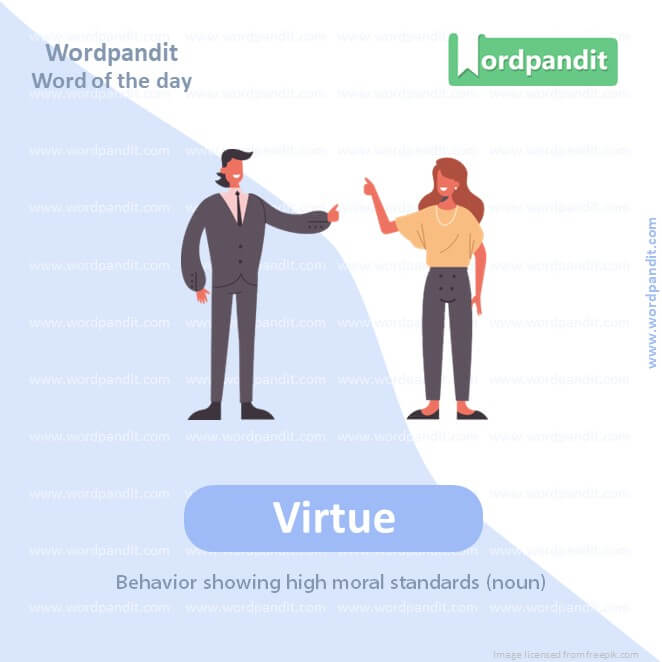
WORD-1: Virtue
CONTEXT: Throughout history, kindness has been a virtue that all people can appreciate. As Mark Twain said, “Kindness is the language the blind can see and the deaf can hear.”
SOURCE: Psychology Today
EXPLANATORY PARAGRAPH: Virtue is like a superpower for being really good. It means you have qualities that are nice, like being honest, kind, or brave. It’s like being a hero in real life by doing the right things and helping others.
MEANING: Behavior showing high moral standards (noun).
PRONUNCIATION: ver-choo
SYNONYMS: Goodness, Integrity, Honesty, Morality, Righteousness, Ethicalness, Nobility.
USAGE EXAMPLES:
1. Kindness is a virtue that everyone should practice.
2. He was known for his virtue and honesty.
3. Patience is a virtue when dealing with young children.
4. She admired the virtue of selflessness in her mentor.
WORD-2: Nuances
CONTEXT: Between 1900 and 1980, only 35 papers touched on kindness in psychology journals, leaving it largely unexplored. In the past decade, over 1,000 papers have explored its nuances. Science now recognizes the significance of this behavior on the human experience, specifically the impact and benefits of deliberate acts of kindness.
SOURCE: Psychology Today
EXPLANATORY PARAGRAPH: Nuances are like the little details in something that make it special or different. It’s like when you’re coloring and you use slightly different shades of blue for the sky. Those little changes in color are nuances.
MEANING: Subtle differences or distinctions in expression, meaning, or response (noun).
PRONUNCIATION: noo-ahn-ses
SYNONYMS: Subtleties, Fine Points, Distinctions, Shadings, Overtones, Undertones, Refinements.
USAGE EXAMPLES:
1. The artist captured the nuances of the landscape beautifully.
2. Understanding the nuances of the language can be challenging.
3. The book is full of emotional nuances.
4. The actor’s performance was filled with nuanced expressions.
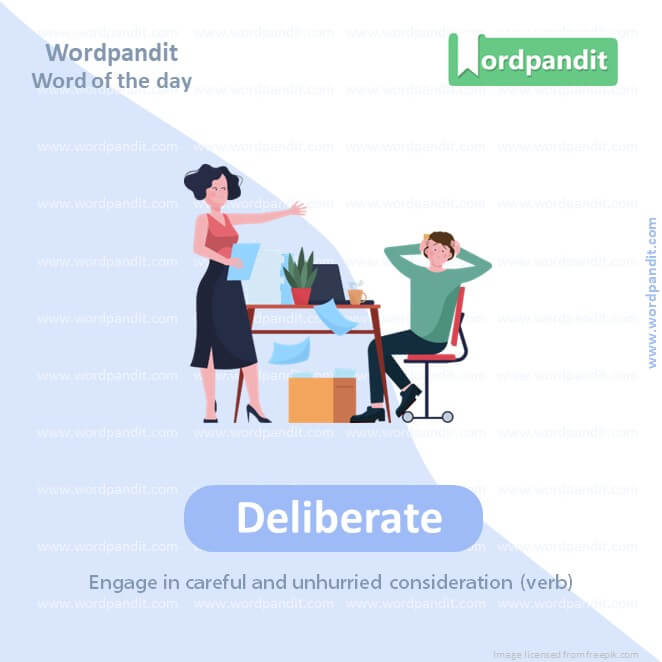
WORD-3: Deliberate
CONTEXT: Between 1900 and 1980, only 35 papers touched on kindness in psychology journals, leaving it largely unexplored. In the past decade, over 1,000 papers have explored its nuances. Science now recognizes the significance of this behavior on the human experience, specifically the impact and benefits of deliberate acts of kindness.
SOURCE: Psychology Today
EXPLANATORY PARAGRAPH: Deliberate means doing something on purpose, not by accident. Like when you choose your favorite candy from a box on purpose. You think about it and then decide which one you want.
MEANING: Done consciously and intentionally (adjective); engage in careful and unhurried consideration (verb).
PRONUNCIATION: de-lib-er-it (adjective), de-lib-er-ate (verb)
SYNONYMS (Adjective): Intentional, Calculated, Conscious, Willful, Purposeful, Planned, Premeditated.
SYNONYMS (Verb): Consider, Contemplate, Think Over, Ponder, Reflect, Mull Over, Weigh.
USAGE EXAMPLES:
1. It was a deliberate choice to move to the city.
2. She took a deliberate step towards a healthier lifestyle.
3. The jury will deliberate before reaching a verdict.
4. His movements were slow and deliberate.
WORD-4: Prejudice
CONTEXT: What is a deliberate act of kindness? It is any type of behavior marked by generosity, consideration, or concern for others without expecting anything in return. These are any small, intentional actions we take to help another. The list of ways that we can be deliberately kind is endless.
SOURCE: Psychology Today
EXPLANATORY PARAGRAPH: Prejudice is when someone decides they don’t like something or someone without a good reason. It’s like deciding you don’t like broccoli without ever trying it. Prejudice isn’t fair because it’s judging without understanding.
MEANING: Preconceived opinion that is not based on reason or actual experience (noun).
PRONUNCIATION: prej-uh-dis
SYNONYMS: Bias, Discrimination, Intolerance, Bigotry, Partiality, Preconception, Stereotype.
USAGE EXAMPLES:
1. The campaign was aimed at reducing racial prejudice in society.
2. Prejudice against certain groups can lead to unfair treatment.
3. His decisions were often influenced by his personal prejudices.
4. Education is key to overcoming prejudice.
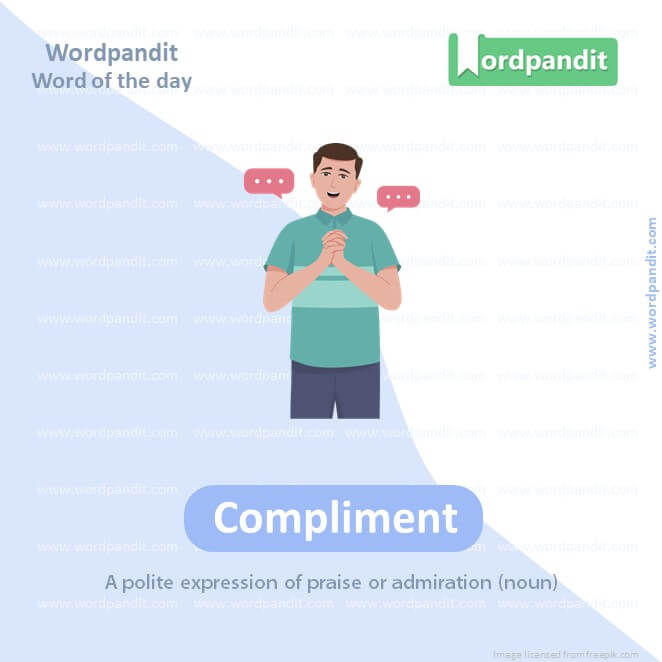
WORD-5: Compliment
CONTEXT: Smile at a stranger, say good morning, offer your assistance, thank a coworker, give up your seat, allow someone to merge in traffic, listen with empathy, or give someone a genuine compliment. For example, I recently told the woman behind the counter of a go-to lunch spot that she “had a great vibe.” She responded with a huge smile, thanked me, and told me what I said really meant a lot. Remember, this is not meant to be complicated. Simple, intentional acts of kindness yield the same benefits as large-scale ones.
SOURCE: Psychology Today
EXPLANATORY PARAGRAPH: A compliment is when you say something nice about someone or something. Like telling your friend they have a pretty dress or saying someone did a great job. It’s a way to make others feel good and happy.
MEANING: A polite expression of praise or admiration (noun); politely congratulate or praise (verb).
PRONUNCIATION: kom-pli-ment
SYNONYMS (Noun): Praise, Flattery, Admiration, Commendation, Applause, Tribute, Endorsement.
SYNONYMS (Verb): Praise, Congratulate, Applaud, Commend, Flatter, Admire, Extol.
USAGE EXAMPLES:
1. He received a compliment on his excellent presentation.
2. She complimented the chef on the delicious meal.
3. A sincere compliment can brighten someone’s day.
4. The teacher complimented the students on their hard work.
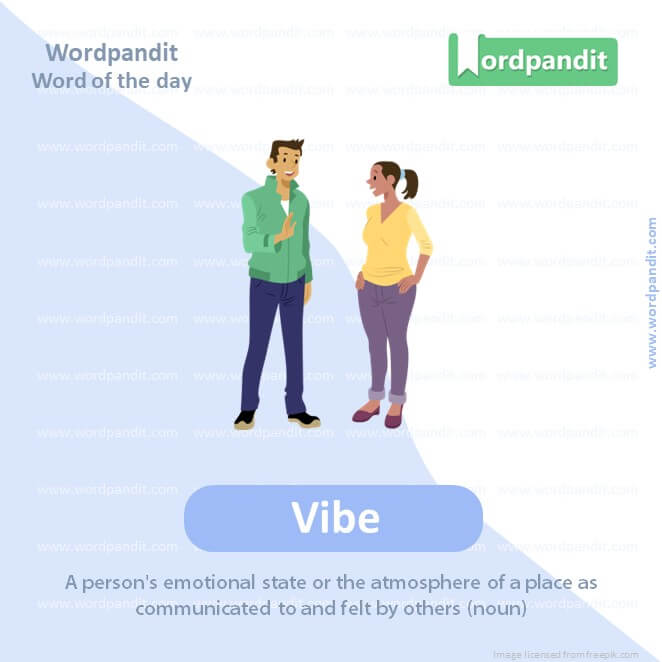
WORD-6: Vibe
CONTEXT: Smile at a stranger, say good morning, offer your assistance, thank a coworker, give up your seat, allow someone to merge in traffic, listen with empathy, or give someone a genuine compliment. For example, I recently told the woman behind the counter of a go-to lunch spot that she “had a great vibe.” She responded with a huge smile, thanked me, and told me what I said really meant a lot. Remember, this is not meant to be complicated. Simple, intentional acts of kindness yield the same benefits as large-scale ones.
SOURCE: Psychology Today
EXPLANATORY PARAGRAPH: Vibe is like the feeling you get from a place or a person. It’s not something you can see or touch, but you can feel it. Like when you walk into a room and feel happy because it’s bright and fun. That’s the room’s vibe.
MEANING: A person’s emotional state or the atmosphere of a place as communicated to and felt by others (noun).
PRONUNCIATION: vahyb
SYNONYMS: Atmosphere, Aura, Mood, Ambiance, Feeling, Energy, Spirit.
USAGE EXAMPLES:
1. The cafe had a relaxed and cozy vibe.
2. She gives off a positive vibe.
3. The party had a great vibe with everyone dancing and having fun.
4. He could sense the tense vibe in the meeting room.
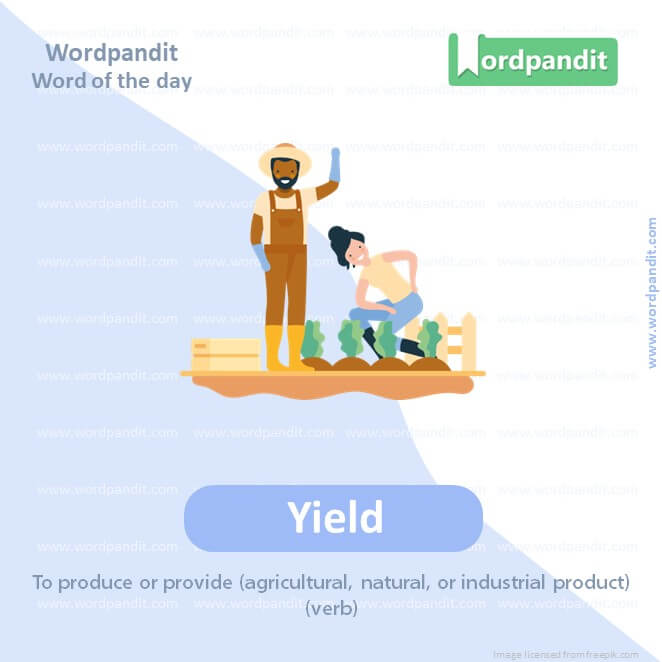
WORD-7: Yield
CONTEXT: Smile at a stranger, say good morning, offer your assistance, thank a coworker, give up your seat, allow someone to merge in traffic, listen with empathy, or give someone a genuine compliment. For example, I recently told the woman behind the counter of a go-to lunch spot that she “had a great vibe.” She responded with a huge smile, thanked me, and told me what I said really meant a lot. Remember, this is not meant to be complicated. Simple, intentional acts of kindness yield the same benefits as large-scale ones.
SOURCE: Psychology Today
EXPLANATORY PARAGRAPH: Yield can mean two things. One, it’s like when a plant grows fruits or vegetables. The fruits are what the plant yields. Two, it’s like when you let someone go first, like letting another car drive ahead of you on the road.
MEANING: To produce or provide (agricultural, natural, or industrial product) (verb); to give way to arguments, demands, or pressure (verb).
PRONUNCIATION: yeeld
SYNONYMS (Verb – Produce): Produce, Generate, Bear, Provide, Give, Furnish, Supply.
SYNONYMS (Verb – Give Way): Surrender, Concede, Submit, Relinquish, Cede, Accede, Bow.
USAGE EXAMPLES:
1. The apple trees yielded an abundant harvest.
2. After much negotiation, he finally yielded to their demands.
3. The investment yielded high returns.
4. The driver yielded to the pedestrians.
WORD-8: Profound
CONTEXT: Deliberate acts of kindness also have a profound impact on the individual we express it. We will experience stronger social connections, fewer feelings of loneliness, and a greater desire to commit acts of kindness ourselves.
SOURCE: Psychology Today
EXPLANATORY PARAGRAPH: Profound is like something that is very, very deep. It can be a thought that makes you think hard, or a feeling that is really strong. Like when you love someone a lot, that’s a profound feeling.
MEANING: Very great or intense; having or showing great knowledge or insight (adjective).
PRONUNCIATION: pro-found
SYNONYMS: Deep, Intense, Heartfelt, Thoughtful, Insightful, Significant, Meaningful.
USAGE EXAMPLES:
1. The book had a profound impact on me.
2. She expressed profound sorrow over the loss.
3. His speech was profound and moving.
4. The experience had a profound effect on his life.
WORD-9: Fostering
CONTEXT: Deliberate acts of kindness wield profound influence, offering immense health benefits and fostering stronger social connections. Yet, our tendency to underestimate the impact of these gestures actively hinders our potential for widespread well-being. When we commit to keeping our acts of kindness simple yet intentional, we can overcome those obstacles. It will make us, and those receiving our kindness, feel great. It is not hard to do. Let’s do more of that.
SOURCE: Psychology Today
EXPLANATORY PARAGRAPH: Fostering is like helping something grow or develop. It’s like when you take care of a plant by watering it and giving it sunlight, or when you help a friend learn something new. You’re helping them get better or stronger.
MEANING: Encouraging or promoting the development of something (verb).
PRONUNCIATION: fos-ter-ing
SYNONYMS: Encouraging, Promoting, Nurturing, Cultivating, Supporting, Advancing, Stimulating.
USAGE EXAMPLES:
1. The program is aimed at fostering creativity in children.
2. She played a key role in fostering good relations between the teams.
3. The school environment is fostering a love of learning.
4. Fostering teamwork is essential in the workplace.
WORD-10: Obstacles
CONTEXT: Deliberate acts of kindness wield profound influence, offering immense health benefits and fostering stronger social connections. Yet, our tendency to underestimate the impact of these gestures actively hinders our potential for widespread well-being. When we commit to keeping our acts of kindness simple yet intentional, we can overcome those obstacles. It will make us, and those receiving our kindness, feel great. It is not hard to do. Let’s do more of that.
SOURCE: Psychology Today
EXPLANATORY PARAGRAPH: Obstacles are like things that get in your way when you’re trying to do something. Imagine you’re running a race and there are hurdles you have to jump over. Those hurdles are obstacles. They make it harder, but you can overcome them!
MEANING: Things that block one’s way or prevent or hinder progress (noun).
PRONUNCIATION: ob-sta-kuls
SYNONYMS: Barriers, Hurdles, Impediments, Obstructions, Challenges, Blockages, Hindrances.
USAGE EXAMPLES:
1. She overcame many obstacles to achieve her goals.
2. Financial obstacles can be difficult to navigate.
3. The team faced several obstacles during the project.
4. Removing obstacles to education is important for children’s development.
vocabulary enrichment
In the realm of language acquisition and proficiency, one crucial element takes center stage: vocabulary enrichment. The process of broadening one’s lexicon goes beyond mere word accumulation, it is an essential facet that enables effective communication, comprehensive understanding, and refined expression of thoughts.
Vocabulary enrichment should be approached as a continuous journey, an iterative process that is both interactive and dynamic. It begins with fostering an active interest in words and their meanings. A deep dive into the history, etymology, and the varied context in which a word is utilized often unveils captivating stories. This engagement with language paints a vivid picture, ensuring words stick in your memory and are easier to recall.
The second critical aspect to vocabulary enrichment involves reading. As you immerse yourself in diverse forms of literature – books, newspapers, blogs, or academic articles – you encounter an array of new words. Make it a habit to not gloss over these unknown terms, but rather seek their meanings and usage. Admission to this world of words will gradually extend your vocabulary breadth, amplifying your ability to comprehend complex concepts and communicate fluently.
Yet, vocabulary enrichment is not just about passively accumulating words, but actively using them. Include the new words learned in your daily conversations and writing. This not only reinforces their meaning but also familiarizes you with their appropriate usage.
Try out simple and engaging techniques like crosswords, word puzzles, and vocabulary apps. They keep the process fun and game-like, avoiding the monotony that can come with learning.
As a final note, remember that vocabulary enrichment is a marathon, not a sprint. It requires patience, persistence, and an undeniable curiosity about the power and magic of words. So, embark on this linguistic odyssey and discover the transformative impact vocabulary enrichment can have both professionally and personally.











